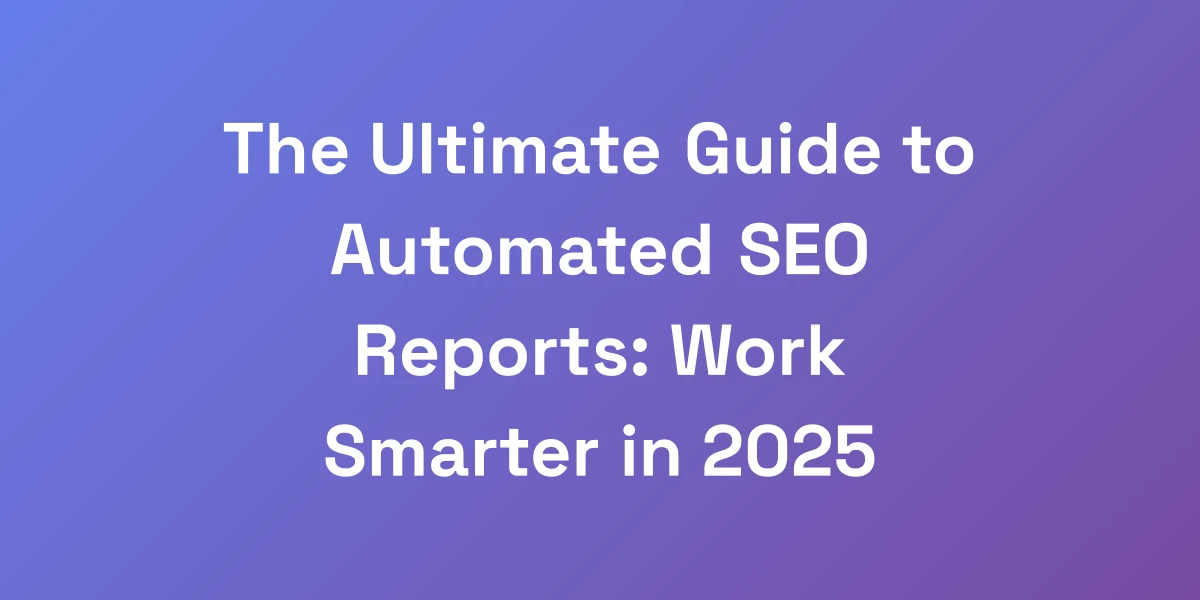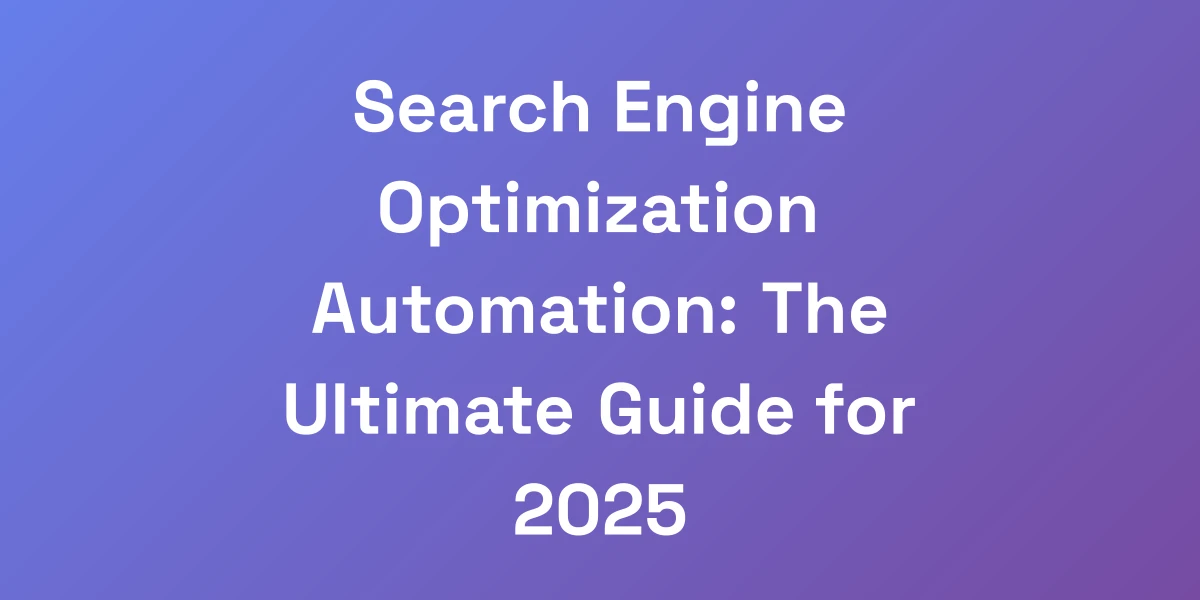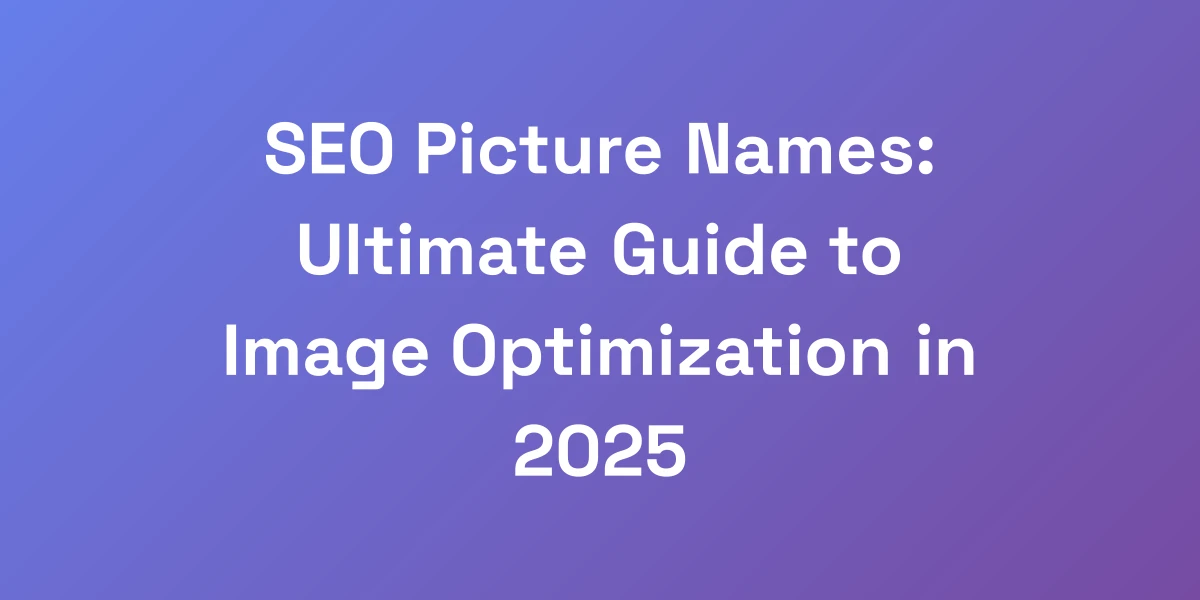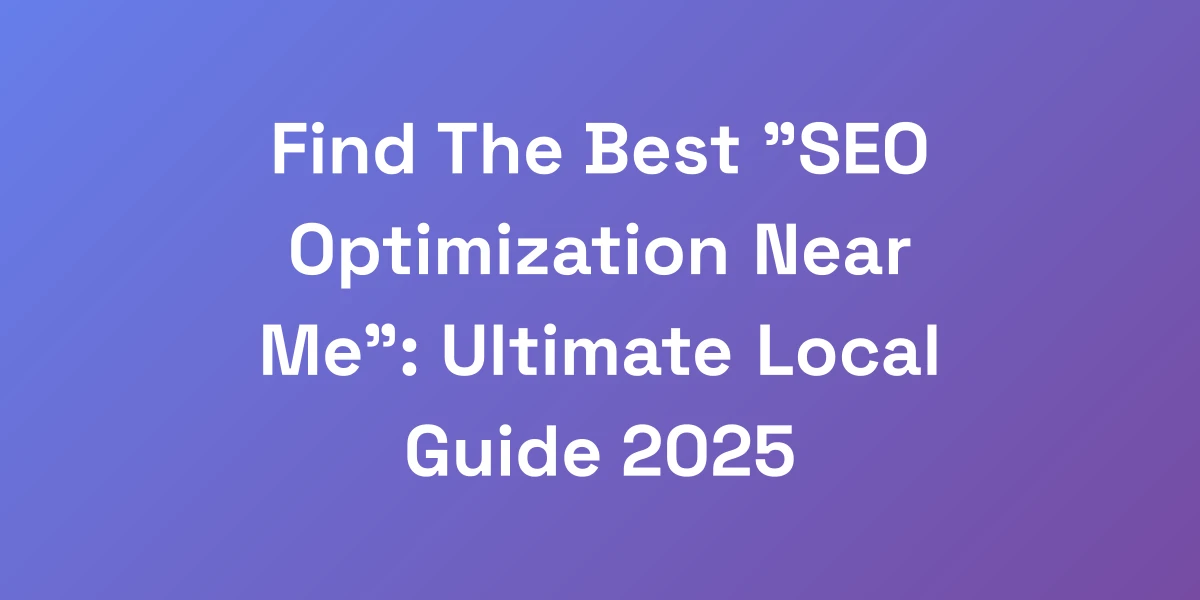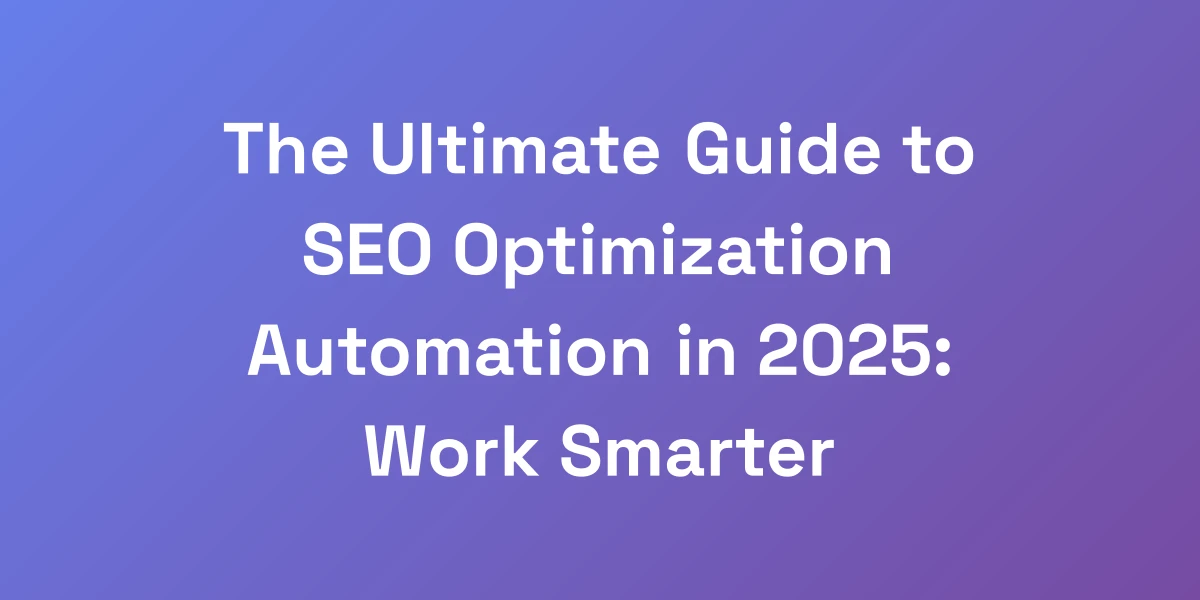
The Ultimate Guide to SEO Optimization Automation in 2025: Work Smarter
Feb 24, 2025 | By [email protected]
Introduction
Ever felt overwhelmed by the sheer volume of tasks required to optimize your website for search engines? You’re not alone.
In the fast-paced world of digital marketing, SEO optimization automation has emerged as a vital tool for professionals striving to work smarter, not harder.
Imagine having a digital assistant that handles repetitive SEO tasks, freeing you up to focus on creative strategies and content that truly resonates with your audience.
Sounds ideal, right?
The landscape of SEO is rapidly evolving, and automation isn’t just a trend—it’s a necessity.
From advanced AI-driven tools to comprehensive automation platforms, the SEO tools market research available today can significantly enhance your SEO efforts.
But how do you navigate this complex terrain?
In this guide, we’ll unravel the intricacies of SEO optimization automation, addressing common challenges and showcasing how automation can revolutionize your approach to digital marketing.
Ready to transform your SEO strategy and achieve outstanding results without burning out?
Let’s embark on this journey together and explore the future of SEO automation in 2025.
Understanding the Revolution of SEO Automation
In my journey as a content creator and productivity enthusiast, I’ve discovered that SEO optimization automation isn’t just a fancy buzzword – it’s a game-changer.
Think of it as your digital marketing autopilot, handling those repetitive tasks while you focus on strategy and creativity.
The landscape of SEO has evolved dramatically, and automation tools have become increasingly sophisticated, incorporating AI and machine learning to deliver more intelligent, efficient solutions.
Let’s dive into how these tools are revolutionizing the way we approach SEO.
The Evolution of SEO Automation Technologies
SEO automation has come a long way since the early days of basic keyword tools and manual link building.
With advancements in AI and machine learning, today’s SEO tools offer comprehensive solutions that integrate multiple aspects of SEO into unified platforms.
From automated keyword research to real-time rank tracking and content optimization, these technologies streamline processes that once consumed hours of manual effort.
For instance, tools like Semrush and Ahrefs have evolved to provide not just data, but actionable insights powered by AI.
This shift allows marketers to make informed decisions faster, adapting to search engine algorithm changes with greater agility.
Key Benefits of Automating SEO Tasks
Automation in SEO brings a plethora of benefits that enhance both efficiency and effectiveness.
Here are some of the key advantages:
- Time Savings: According to recent studies, 15.6% of respondents save over 10 hours per week using SEO automation tools.
- Increased Accuracy: Automation reduces the risk of human error, ensuring more reliable data and consistent implementation of SEO strategies.
- Scalability: Automated tools can handle large volumes of data and tasks, making it easier to scale your SEO efforts without additional resources.
- Enhanced Insights: Advanced analytics and reporting features provide deeper insights into your SEO performance, allowing for better strategy adjustments.
- Cost Efficiency: By automating repetitive tasks, businesses can allocate their budget more effectively, investing in areas that drive growth.
Common Misconceptions About SEO Automation
Despite its benefits, there are several misconceptions surrounding SEO optimization automation that can deter businesses from adopting these tools.
One common myth is that automation can replace human expertise entirely.
While automation handles repetitive and data-intensive tasks efficiently, the strategic and creative aspects of SEO still require a human touch.
Another misconception is that automation tools are prohibitively expensive.
In reality, there are a variety of tools available to suit different budgets and needs, making SEO automation accessible to businesses of all sizes.
Additionally, some believe that automation can lead to black-hat SEO practices, but reputable tools are designed to comply with search engine guidelines, ensuring ethical optimization.
The Role of AI in Modern SEO Automation
Artificial Intelligence (AI) plays a pivotal role in modern SEO optimization automation.
AI-powered tools can analyze vast amounts of data quickly, identifying patterns and trends that would take humans much longer to discern.
For example, AI-driven keyword research tools can predict emerging trends, allowing marketers to capitalize on high-value keywords before they become saturated.
Moreover, AI enhances the ability of SEO tools to provide personalized recommendations, optimizing content for both search engines and user intent.
This intelligent automation not only improves efficiency but also ensures that SEO strategies are data-driven and aligned with the latest market dynamics.
Impact on Digital Marketing ROI
Implementing SEO optimization automation can have a profound impact on your digital marketing ROI.
Businesses using SEO automation report significant improvements in their ROI, as these tools enable more efficient use of resources and better-targeted strategies.
For instance, e-commerce businesses have seen ROI increases ranging from 200% to 275% through automated SEO practices.
This enhancement is largely due to the ability of automation tools to optimize online visibility, attract more traffic, and convert visitors into customers more effectively.
Moreover, the time saved from automating mundane tasks allows marketers to invest more effort into high-impact areas, further driving ROI growth.
Essential SEO Tasks You Should Automate Today
After years of experimenting with various SEO tools and strategies, I’ve identified the key areas where automation delivers the most impact.
From technical audits to content optimization, automation can transform hours of manual work into minutes of automated efficiency.
The secret lies in knowing which tasks to automate and which require human touch.
I’ll share my personal workflow and the exact tools I use to maintain high-ranking content across multiple platforms.
Keyword Research and Analysis Automation
Keyword research is the foundation of any successful SEO strategy, but it can be incredibly time-consuming.
Automated keyword research tools like Semrush and Ahrefs streamline this process by providing comprehensive keyword data, including search volume, competition, and trend analysis.
These tools use AI to predict which keywords are likely to perform well, allowing you to focus on those that offer the highest potential ROI.
Additionally, automated analysis can uncover long-tail keywords that might be overlooked in manual research, giving you a competitive edge.
Integrating these tools into your workflow ensures that your keyword strategy is both thorough and efficient.
Technical SEO Audit Automation
Maintaining a technically sound website is crucial for SEO, but manual audits can be laborious and prone to oversight.
Tools like Sitebulb automate technical SEO audits, scanning your website for issues such as crawl errors, broken links, and schema markup problems.
This automation not only speeds up the audit process but also ensures comprehensive coverage, identifying issues that might be missed during manual checks.
By regularly conducting automated technical audits, you can maintain optimal site health, improving your website’s performance and search engine rankings.
Content Optimization and Enhancement
Creating high-quality content is essential, but optimizing it for SEO requires attention to detail.
Automation tools can assist in enhancing your content by suggesting keyword placements, readability improvements, and semantic enhancements.
For example, Clearscope analyzes your content against top-ranking pages, providing actionable suggestions to improve relevance and comprehensiveness.
Additionally, AI-driven tools can help in refreshing old content, ensuring it remains relevant and continues to perform well in search rankings.
Incorporating these tools into your content creation process ensures that your content is not only engaging but also optimized for maximum visibility.
Rank Tracking and Reporting
Monitoring your search engine rankings is vital for assessing the effectiveness of your SEO strategies.
Automated rank tracking tools like SEMrush and Moz provide real-time updates on your keyword rankings, allowing you to stay informed about your performance.
These tools generate detailed reports, highlighting changes in rankings and providing insights into factors influencing these shifts.
With automated rank tracking, you can quickly identify areas that need improvement and adjust your strategies accordingly, ensuring sustained SEO success.
Competitor Analysis Automation
Understanding what your competitors are doing can provide valuable insights for your own SEO strategy.
Automated competitor analysis tools like Ahrefs and SpyFu allow you to monitor your competitors’ keyword strategies, backlink profiles, and content tactics.
These tools use AI to analyze vast amounts of data, identifying patterns and trends that can inform your own strategies.
By automating competitor analysis, you can stay ahead of the curve, adapting your approach based on real-time insights and maintaining a competitive advantage in your niche.
Link Building and Monitoring
Building quality backlinks is a critical component of SEO, but managing this process manually can be daunting.
Automation tools like Majestic and BuzzStream streamline link building by identifying potential link opportunities, managing outreach campaigns, and monitoring backlink profiles.
These tools use AI to evaluate the quality and relevance of potential backlinks, ensuring that your link building efforts are both efficient and effective.
Moreover, automated monitoring allows you to track the performance of your backlinks, identifying any issues such as broken links or negative SEO attacks promptly.
Incorporating these tools into your link building strategy can significantly enhance your website’s authority and search engine rankings.
Top AI-Powered SEO Automation Tools for 2025
Having tested countless SEO tools throughout my career, I’ve curated a list of game-changing automation solutions that consistently deliver results.
These aren’t just any tools – they’re the ones I personally rely on to maintain and grow my online presence.
Each tool offers unique capabilities, from advanced content optimization to comprehensive technical audits, and I’ll show you exactly how to leverage them for maximum impact.
Comprehensive Platform Solutions
For those seeking an all-in-one solution, platforms like SEMrush and Ahrefs offer comprehensive SEO automation features.
These platforms integrate various SEO tasks into a single dashboard, providing tools for keyword research, backlink analysis, rank tracking, and content optimization.
Their AI-driven insights help prioritize tasks based on potential impact, ensuring that your efforts are focused on strategies that drive results.
Additionally, these platforms often include collaboration features, making them ideal for teams working on large-scale SEO projects.
Specialized Task-Specific Tools
If you prefer to use specialized tools for specific SEO tasks, options like Clearscope for content optimization and Sitebulb for technical audits are excellent choices.
Clearscope leverages AI to enhance your content’s SEO performance, ensuring it meets the latest search engine requirements and user intent.
On the other hand, Sitebulb automates comprehensive technical SEO audits, identifying and resolving issues that could hinder your website’s performance.
By using task-specific tools, you can achieve a higher level of precision and effectiveness in each aspect of your SEO strategy.
Budget-Friendly Options for Beginners
Starting with SEO automation doesn’t have to break the bank.
Tools like Ubersuggest and Mangools offer affordable pricing plans, making them ideal for beginners and small businesses.
These tools provide essential SEO features such as keyword research, backlink analysis, and rank tracking without the complexity or cost of more advanced platforms.
Despite their affordability, they deliver robust performance, allowing you to automate key SEO tasks and improve your website’s visibility without a significant financial investment.
These options are perfect for those looking to dip their toes into SEO automation before committing to more comprehensive solutions.
Enterprise-Level Automation Suites
For large businesses with extensive SEO needs, enterprise-level automation suites like BrightEdge and Conductor offer advanced features and scalability.
These platforms provide deep analytics, custom reporting, and integration capabilities that cater to complex SEO strategies and large data sets.
Their AI-powered insights help in making strategic decisions, optimizing content at scale, and managing extensive backlink profiles efficiently.
Moreover, enterprise tools often include dedicated support and training, ensuring that your team can leverage the full potential of the platform.
Investing in these suites ensures that your SEO operations are streamlined, scalable, and aligned with your business goals.
Integration Capabilities and Ecosystem
One of the standout features of top SEO automation tools is their ability to integrate seamlessly with other platforms and tools in your marketing ecosystem.
Tools like Zapier enable automation of workflows by connecting SEO tools with CMS platforms, email marketing services, and analytics tools.
This interoperability ensures that data flows smoothly between different systems, enhancing efficiency and enabling more comprehensive data analysis.
Additionally, many SEO tools offer APIs, allowing for custom integrations tailored to your specific needs.
Leveraging these integration capabilities ensures that your SEO automation is cohesive and aligned with your broader marketing strategies.
Pricing Comparison and Value Analysis
When selecting SEO automation tools, it’s crucial to consider both pricing and the value they offer.
While platform-based solutions like SEMrush and Ahrefs come with higher price tags, they provide extensive features that justify the investment for businesses with comprehensive SEO needs.
On the other hand, budget-friendly options like Ubersuggest offer essential functionalities at a fraction of the cost, making them ideal for startups and small businesses.
Enterprise-level tools, though expensive, deliver unparalleled scalability and advanced features that cater to large-scale operations.
Ultimately, the best tool for you depends on your specific requirements, budget, and the scale of your SEO activities.
Conducting a thorough value analysis ensures that you select a tool that not only fits your financial constraints but also enhances your SEO performance effectively.
Implementation Strategies for Maximum Impact
The difference between success and failure with SEO automation often lies in the implementation strategy.
Through my experience managing multiple successful websites, I’ve developed a systematic approach to implementing automation tools effectively.
It’s not just about having the right tools – it’s about using them in the right way.
Let me share my proven framework for integrating automation into your existing SEO workflow.
Creating an Automation Workflow
Establishing a clear and structured automation workflow is the first step towards successful SEO automation.
Begin by mapping out all the SEO tasks that can be automated, such as keyword research, content optimization, and rank tracking.
Next, select the appropriate tools for each task, ensuring they integrate seamlessly with your existing systems.
Create a timeline for implementing each tool, allowing for gradual integration and testing.
Document each step of the process, outlining how automated tasks will interact with manual efforts for maximum efficiency.
Having a well-defined workflow ensures that automation enhances your SEO strategy without causing disruptions.
Setting Up Performance Metrics
To measure the effectiveness of your SEO automation efforts, it’s essential to establish clear performance metrics.
Identify key indicators such as organic traffic, keyword rankings, backlink quality, and conversion rates.
Use your automation tools to track these metrics in real-time, providing you with actionable insights.
Set specific, measurable goals for each metric, such as increasing organic traffic by 20% within six months or improving keyword rankings for 10 high-priority terms.
Regularly review these metrics to assess the impact of your automation strategies and make data-driven adjustments as needed.
By monitoring performance metrics, you ensure that your SEO automation efforts are aligned with your business objectives.
Training Team Members
Successful implementation of SEO automation tools requires that your team is well-versed in using them effectively.
Provide comprehensive training sessions to familiarize your team with the functionalities and features of each tool.
Encourage hands-on practice, allowing team members to explore and utilize the tools in real-world scenarios.
Establish best practices and standard operating procedures for using automation tools, ensuring consistency across your SEO efforts.
Additionally, foster a culture of continuous learning, keeping your team updated on the latest advancements and updates in SEO automation technologies.
Well-trained team members are crucial for maximizing the benefits of SEO automation and maintaining a high level of efficiency.
Avoiding Common Pitfalls
While SEO automation offers numerous advantages, there are common pitfalls to be aware of to ensure smooth implementation.
One major pitfall is over-reliance on automation, neglecting the strategic and creative aspects of SEO that require human insight.
To avoid this, maintain a balance between automated tasks and manual interventions, ensuring that your SEO strategy remains comprehensive and adaptive.
Another common issue is improper tool selection, leading to inefficiencies and wasted resources.
Thoroughly research and test tools before fully integrating them into your workflow, ensuring they meet your specific needs and align with your goals.
Additionally, lack of proper training can result in underutilization of tool features, limiting their effectiveness.
By being aware of these pitfalls and proactively addressing them, you can ensure a successful and efficient implementation of SEO automation.
Scaling Your Automation Strategy
As your business grows, so too should your SEO automation strategy.
Start by identifying scalable tools that can handle increased data volumes and more complex tasks without compromising performance.
For example, enterprise-level platforms like BrightEdge can manage extensive SEO operations, accommodating the growth of your website and online presence.
Additionally, consider integrating new automation tools that complement your existing setup, enhancing your SEO capabilities as needed.
Regularly review and adjust your automation processes to align with changing business objectives and market dynamics.
By planning for scalability, you ensure that your SEO automation strategy continues to drive growth and maintain efficiency as your business evolves.
Measuring Success and ROI
Measuring the success of your SEO automation efforts is crucial for understanding their impact and guiding future strategies.
Utilize the performance metrics you’ve established to assess the effectiveness of your automation tools.
Calculate the return on investment (ROI) by comparing the costs of automation tools against the benefits gained, such as increased traffic, higher rankings, and improved conversion rates.
For instance, businesses using SEO automation report substantial ROI improvements, with some e-commerce platforms seeing up to 275% ROI.
Regularly evaluate these metrics to determine which aspects of your automation strategy are working and where adjustments are needed.
By continuously measuring success, you can optimize your SEO automation strategy for sustained growth and effectiveness.
Future Trends in SEO Automation
As someone deeply immersed in the digital marketing space, I’m particularly excited about the emerging trends in SEO automation.
The integration of advanced AI, machine learning, and natural language processing is opening up new possibilities we couldn’t have imagined just a few years ago.
These developments are set to transform how we approach SEO optimization strategies for 2025, making it more intuitive and effective than ever before.
Let’s explore the future trends that will shape SEO automation in 2025 and beyond.
Emerging AI Technologies in SEO
AI technologies continue to evolve, driving the next wave of innovation in SEO optimization automation.
Natural language processing (NLP) advancements enable tools to better understand and interpret user intent, improving content relevance and quality.
Machine learning algorithms enhance the predictive capabilities of SEO tools, allowing for more accurate forecasting of trends and performance.
Additionally, AI is being integrated into voice search optimization, ensuring that content is tailored to conversational queries and voice-based search methods.
These emerging technologies make SEO tools more intelligent, adaptive, and aligned with evolving search engine algorithms.
Predictive Analytics and SEO
Predictive analytics is becoming increasingly integral to SEO optimization automation.
By analyzing historical data and identifying patterns, predictive analytics tools forecast future trends, helping businesses stay ahead of the competition.
These tools can predict shifts in keyword popularity, identify emerging topics, and suggest strategic adjustments to maintain and improve search rankings.
Incorporating predictive analytics into your SEO strategy ensures that your efforts are proactive rather than reactive, allowing for more effective and targeted optimization.
For example, AI-driven tools can anticipate changes in search algorithms and adjust your SEO strategies accordingly, mitigating potential negative impacts.
Voice Search Optimization Automation
With the rise of smart devices and voice assistants, voice search is becoming a significant aspect of SEO.
Automation tools are evolving to optimize content for voice search, focusing on conversational keywords and natural language usage.
These tools analyze voice search trends and adjust your content to align with how users interact with voice assistants like Siri, Alexa, and Google Assistant.
Optimizing for voice search ensures that your content remains accessible and relevant in an increasingly voice-driven search landscape.
By automating this aspect of SEO, you can cater to the growing number of users who prefer voice queries over traditional text-based searches.
Mobile-First Automation Tools
As mobile search continues to dominate, optimizing for mobile SEO is non-negotiable.
Mobile-first automation tools focus on enhancing the mobile user experience, ensuring that your website is fully optimized for mobile devices.
These tools analyze factors such as page load speed, mobile responsiveness, and user interface compatibility, providing actionable insights to improve mobile SEO performance.
By prioritizing mobile optimization, you ensure that your website meets the expectations of today’s mobile-centric users, driving higher engagement and better search rankings.
Automation in mobile SEO allows for continuous monitoring and optimization, adapting to changes in mobile usage patterns and search behaviors.
Privacy-Focused SEO Automation
With increasing concerns over data privacy, SEO optimization automation is adapting to prioritize user privacy.
Automation tools are incorporating privacy-focused features, ensuring compliance with regulations like GDPR and CCPA.
These tools provide options to anonymize data, manage user consent, and securely handle sensitive information, maintaining ethical SEO practices.
By focusing on privacy, businesses can build trust with their audience while still leveraging the power of automation to enhance their SEO strategies.
Privacy-focused SEO automation ensures that your optimization efforts are both effective and compliant with current data protection standards.
Integration with Other Marketing Tools
In the future, SEO automation tools will offer deeper integration with other marketing platforms, creating a more unified marketing ecosystem.
Integration with email marketing services, social media management, and CRM systems allows for a holistic approach to digital marketing.
This interconnectedness ensures that your SEO efforts complement and enhance other marketing strategies, driving cohesive and effective campaigns.
For instance, integrating SEO tools with the top CMS for SEO like WordPress and marketing automation platforms like HubSpot will streamline workflows and data sharing.
By leveraging these integrations, businesses can create more synchronized and impactful marketing strategies, maximizing their overall digital presence.
Conclusion
Embracing SEO optimization automation is no longer optional—it’s essential for staying competitive in the ever-evolving digital landscape.
From saving precious time and improving accuracy to unlocking deeper insights and enhancing ROI, the benefits are undeniable.
By integrating the right tools and strategies, you can transform your SEO efforts, focusing on what truly matters while automation handles the rest.
As we’ve explored, the future of SEO automation is bright, with emerging AI technologies and innovative trends set to redefine how we approach search optimization.
Now is the time to invest in SEO automation tools and implement effective strategies that will propel your business forward.
Ready to work smarter and achieve exceptional SEO results?
Start exploring these automation tools today and witness the transformative impact on your digital marketing efforts.
Have any thoughts or experiences with SEO automation? Drop a comment below—we’d love to hear from you!
